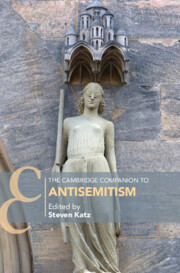Book contents
- The Cambridge Companion to Antisemitism
- Cambridge Companions to Religion
- The Cambridge Companion to Antisemitism
- Copyright page
- Contents
- Contributors
- Acknowledgments
- Introduction
- Part I The Classical Period
- 1 Antisemitism in the Pagan World
- 2 New Testament Origins of Christian Anti-Judaism
- 3 Anti-Judaism in Early Christian Writings
- 4 Church Fathers and Antisemitism from the 2nd Century through Augustine (end of 450 CE)
- 5 Christians, Jews, and Judaism in the Eastern Mediterranean and Near East, c. 150–400 CE
- 6 Christianizing the Roman Empire
- 7 Antisemitism in Byzantium, 4th–7th Centuries
- Part II Medieval Times
- Part III The Modern Era
- Appendix The International Holocaust Remembrance Alliance: Working Definition of Antisemitism
- Index
- Cambridge Companions to Religion
- References
4 - Church Fathers and Antisemitism from the 2nd Century through Augustine (end of 450 CE)
from Part I - The Classical Period
Published online by Cambridge University Press: 05 May 2022
- The Cambridge Companion to Antisemitism
- Cambridge Companions to Religion
- The Cambridge Companion to Antisemitism
- Copyright page
- Contents
- Contributors
- Acknowledgments
- Introduction
- Part I The Classical Period
- 1 Antisemitism in the Pagan World
- 2 New Testament Origins of Christian Anti-Judaism
- 3 Anti-Judaism in Early Christian Writings
- 4 Church Fathers and Antisemitism from the 2nd Century through Augustine (end of 450 CE)
- 5 Christians, Jews, and Judaism in the Eastern Mediterranean and Near East, c. 150–400 CE
- 6 Christianizing the Roman Empire
- 7 Antisemitism in Byzantium, 4th–7th Centuries
- Part II Medieval Times
- Part III The Modern Era
- Appendix The International Holocaust Remembrance Alliance: Working Definition of Antisemitism
- Index
- Cambridge Companions to Religion
- References
Summary
This chapter examines antagonism toward Jews and Judaism as expressed by leading Church Fathers in the West. Particular attention is paid to the novel and influential perspective of Augustine.
- Type
- Chapter
- Information
- The Cambridge Companion to Antisemitism , pp. 66 - 82Publisher: Cambridge University PressPrint publication year: 2022
References
Further Reading
- 1
- Cited by

